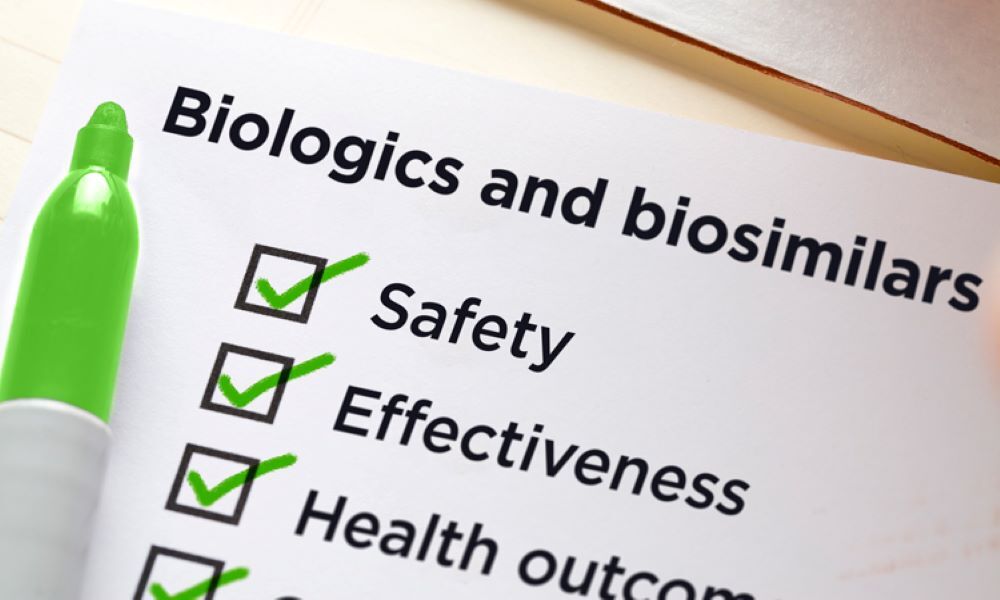Understanding biological medicines, their biosimilars and the PBS
A biosimilar medicine is a highly similar version of an original or ‘reference’ brand of biological medicine. Biosimilars have been tested to show they are as safe and effective as the original brand and play an important role in supporting PBS sustainability.
Biologics, biosimilars and PBS sustainability

Biologics have a significant and positive impact on the treatment of many severe acute and chronic diseases. After the patents on the original (reference) biologics expire, competing manufacturers are able to develop biosimilars, which are highly similar versions of a specific reference biologic (sometimes called the ‘originator’ biologic). Once this happens, market competition usually drives prices down
Podcast: Demystifying biologics, their biosimilars and the PBS
This podcast aims to demystify some of the processes involved in the listing of medicines on the Pharmaceutical Benefits Scheme (PBS). Professor Debra Rowett (Discipline Leader of Pharmacy, University of SA) hosts a conversation with Professor Andrew Wilson (Chair of the PBAC) and Dr Paul Kubler (Consultant Rheumatologist, Royal Brisbane Hospital), covering topics including PBS sustainability, cost-efficacy considerations, and the impact of biosimilars on the PBS listing of biological medicines.
Webinar: Biologics and biosimilars – a practical guide for pharmacists
The use of biologics and biosimilars is increasing for a number of conditions. Pharmacists have a key role to play in ensuring the good governance of these medications, from an overarching hospital perspective through to the dispensing to individual patients. This webinar will provide practical tips for pharmacists to assist them in managing these medications.
Understanding biosimilars: For your patients

Find answers to consumers’ common questions about biosimilars
Avoiding the nocebo effect: talking to your patients about biosimilars
- Patient perception is an important factor in influencing outcomes associated with the use of biosimilars. A patient’s mindset can influence their symptoms and sense of well-being. If they have a poor perception of biosimilars, they are at an increased risk of experiencing the nocebo effect.
- The nocebo effect is when negative expectations of a treatment lead to negative outcomes, unrelated to the physiological action of the treatment.1
- It can arise from language barriers, online media as an information source, interactions with healthcare professionals, the setting in which a patient receives information, and other factors outside the control of healthcare professionals.
- Positive attitudes shown by health professionals and patient education are important factors that mitigate the risk of the nocebo effect.
The Nocebo Effect:
Conversations with consumers around biosimilar medicines
Adapted from: Colloca L, Panaccione R and Murphy TK (2019) The Clinical Implications of Nocebo Effects for Biosimilar Therapy. Front. Pharmacol. 10:1372. doi: 10.3389/fphar.2019.01372
Questions commonly asked about biosimilar medicines 4,5
No. Biosimilar medicines that are approved for use in Australia have been assessed to have no clinically meaningful differences and to be therapeutically equivalent to the reference biological medicine. They have similar health outcomes.
No. The incidence of adverse effects is not higher for biosimilar medicines than for the reference biological medicines. For a biosimilar medicine to be approved for use in Australia, it must have demonstrated to the Therapeutic Goods Administration (TGA) that it has the same safety profile, including the same incidence and severity of adverse effects.
No. The incidence of immunogenicity for biosimilar medicines is not higher than for the reference biological medicines. Immunogenicity data are assessed during the development and registration of all biological medicines, including biosimilar medicines.
No. Since biosimilar medicines have been assessed to be as safe and effective as the reference biological medicine, they provide the same health outcomes. Published international post-market research has found no difference between the safety or health outcomes of patients who switched to biosimilar medicines and those who remained on the reference biological medicine.
No. Changing from a reference biological medicine to the biosimilar medicine or vice versa, is considered to be the same ongoing treatment because these medicines have been assessed to be equally safe and effective.
Yes. The appearance of biological medicines may change, depending on the particular brand chosen. The device may be different, but the medicine it contains is equivalent. You should discuss how best to use the medicine with your patients. Further information is available in the Consumer Medicines Information sheet that comes with the medicine and you can also ask the nurse and/or pharmacist to explain this to patients.
To combat a potential nocebo effect, health professionals can:
- Acknowledge the nocebo effect
- Encourage patients to seek more information on biosimilars
- Encourage patients to speak to their prescriber, nurse or pharmacist about their biosimilar options, ensuring open communication between them and all their health professionals.
- Keep a neutral or positive outlook2
- Address the misconception that a perceived ‘lower price’ of biosimilars connotes lower quality than the reference product.3
References:
- Colloca L, Barsky AJ. Placebo and Nocebo Effects. N Engl J Med. 2020;382(6):554-61
- PharmaCare. Biosimilars FAQ for Patients Victoria, BC: Government of British Columbia; [cited 2021 19 Feb]
- Colloca L, Panaccione R, Murphy TK. The Clinical Implications of Nocebo Effects for Biosimilar Therapy. Front Pharmacol. 2019;10:1372.
- The Department of Health. Biosimilar medicines-the basics for healthcare professionals Canberra: Australian Government, Department of Health; 2017 [cited 2021 19 Feb]
- The Department of Health. Biosimilar medicines-the basics for consumers and carers Canberra: Australian Government, Department of Health; 2017 [cited 2021 19 Feb].
